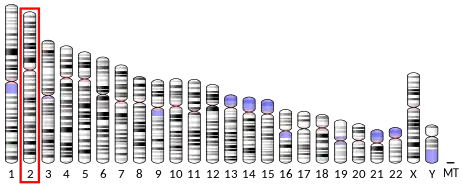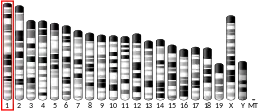ASB1
Ankyrin repeat and SOCS box protein 1 is a protein that is in humans, encoded by the ASB1 gene.[5]
| ASB1 | |||||||||||||||||||||||||||||||||||||||||||||||||||
|---|---|---|---|---|---|---|---|---|---|---|---|---|---|---|---|---|---|---|---|---|---|---|---|---|---|---|---|---|---|---|---|---|---|---|---|---|---|---|---|---|---|---|---|---|---|---|---|---|---|---|---|
| Identifiers | |||||||||||||||||||||||||||||||||||||||||||||||||||
| Aliases | ASB1, ASB-1, ankyrin repeat and SOCS box containing 1 | ||||||||||||||||||||||||||||||||||||||||||||||||||
| External IDs | OMIM: 605758 MGI: 1929735 HomoloGene: 9390 GeneCards: ASB1 | ||||||||||||||||||||||||||||||||||||||||||||||||||
| |||||||||||||||||||||||||||||||||||||||||||||||||||
| |||||||||||||||||||||||||||||||||||||||||||||||||||
| |||||||||||||||||||||||||||||||||||||||||||||||||||
| |||||||||||||||||||||||||||||||||||||||||||||||||||
| |||||||||||||||||||||||||||||||||||||||||||||||||||
| Wikidata | |||||||||||||||||||||||||||||||||||||||||||||||||||
| |||||||||||||||||||||||||||||||||||||||||||||||||||
The protein encoded by this gene is a member of the ankyrin repeat and SOCS box-containing (ASB) family of proteins. They contain ankyrin repeat sequence and SOCS box domain. The SOCS box serves to couple suppressor of cytokine signalling (SOCS) proteins and their binding partners with the elongin B and C complex, possibly targeting them for degradation.[5]
References
- GRCh38: Ensembl release 89: ENSG00000065802 - Ensembl, May 2017
- GRCm38: Ensembl release 89: ENSMUSG00000026311 - Ensembl, May 2017
- "Human PubMed Reference:". National Center for Biotechnology Information, U.S. National Library of Medicine.
- "Mouse PubMed Reference:". National Center for Biotechnology Information, U.S. National Library of Medicine.
- "Entrez Gene: ASB1 ankyrin repeat and SOCS box-containing 1".
External links
- Human ASB1 genome location and ASB1 gene details page in the UCSC Genome Browser.
Further reading
- Kile BT, Schulman BA, Alexander WS, et al. (2002). "The SOCS box: a tale of destruction and degradation". Trends Biochem. Sci. 27 (5): 235–41. doi:10.1016/S0968-0004(02)02085-6. PMID 12076535.
- Gerhard DS, Wagner L, Feingold EA, et al. (2004). "The status, quality, and expansion of the NIH full-length cDNA project: the Mammalian Gene Collection (MGC)". Genome Res. 14 (10B): 2121–7. doi:10.1101/gr.2596504. PMC 528928. PMID 15489334.
- Strausberg RL, Feingold EA, Grouse LH, et al. (2003). "Generation and initial analysis of more than 15,000 full-length human and mouse cDNA sequences". Proc. Natl. Acad. Sci. U.S.A. 99 (26): 16899–903. Bibcode:2002PNAS...9916899M. doi:10.1073/pnas.242603899. PMC 139241. PMID 12477932.
- Kile BT, Metcalf D, Mifsud S, et al. (2001). "Functional analysis of Asb-1 using genetic modification in mice". Mol. Cell. Biol. 21 (18): 6189–97. doi:10.1128/MCB.21.18.6189-6197.2001. PMC 87336. PMID 11509662.
- Kile BT, Viney EM, Willson TA, et al. (2001). "Cloning and characterization of the genes encoding the ankyrin repeat and SOCS box-containing proteins Asb-1, Asb-2, Asb-3 and Asb-4". Gene. 258 (1–2): 31–41. doi:10.1016/S0378-1119(00)00402-9. PMID 11111040.
- Hirosawa M, Nagase T, Ishikawa K, et al. (2000). "Characterization of cDNA clones selected by the GeneMark analysis from size-fractionated cDNA libraries from human brain". DNA Res. 6 (5): 329–36. doi:10.1093/dnares/6.5.329. PMID 10574461.
- Yu W, Andersson B, Worley KC, et al. (1997). "Large-scale concatenation cDNA sequencing". Genome Res. 7 (4): 353–8. doi:10.1101/gr.7.4.353. PMC 139146. PMID 9110174.
- Andersson B, Wentland MA, Ricafrente JY, et al. (1996). "A "double adaptor" method for improved shotgun library construction". Anal. Biochem. 236 (1): 107–13. doi:10.1006/abio.1996.0138. PMID 8619474.
This article is issued from Wikipedia. The text is licensed under Creative Commons - Attribution - Sharealike. Additional terms may apply for the media files.



